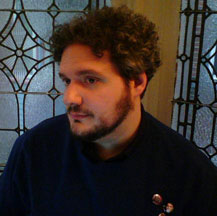Publishing Talks: David Wilk interviews DeWitt Henry of Ploughshares
February 10, 2014 by David
Filed under Publishing History, PublishingTalks
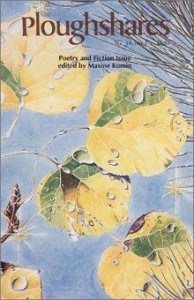 Publishing Talks began as a series of conversations with book industry professionals and other smart people about the future of publishing, books, and culture. As we continue to experience disruption and change in all media businesses, I’ve been talking with some of the people involved in our industry about how they believe publishing might evolve as our culture is affected by technology, climate change, population density, and the ebb and flow of civilization and economics.
Publishing Talks began as a series of conversations with book industry professionals and other smart people about the future of publishing, books, and culture. As we continue to experience disruption and change in all media businesses, I’ve been talking with some of the people involved in our industry about how they believe publishing might evolve as our culture is affected by technology, climate change, population density, and the ebb and flow of civilization and economics.
Recently, the series has been expanding to include conversations about a wider range of subjects beyond my initial interest in the future of publishing. I’ve talked with editors and publishers who have been innovators and leaders in independent publishing in the past and into the present, and will continue to explore the past, present and future of writing, books, and publishing in all sorts of forms and formats, as change continues to be the one constant we can count on.
It’s my hope that these conversations can help us understand the outlines of what is happening in publishing and writing, and how we might ourselves interact with and influence the future of publishing as it unfolds. This week’s interview reflects my interest in comic art, illustrated story telling and new technology as a platform for expanding story telling in interesting and challenging ways.
Ploughshares is one of the great literary magazines of the last fifty years. Founded in 1971 in Boston by writer, teacher and scholar DeWitt Henry and writer and bar owner Peter O’Malley, it has gone on brilliantly from very humble beginnings to publish an extraordinary range of writing. Founded in a bar called the Plough and the Stars in Cambridge, Massachusetts, Ploughshares to give the young and upcoming writers of its time a voice and a platform, the magazine has been a literal breeding ground for great writers of fiction, poetry and nonfiction as well.
One of its innovations was to invite writers to guest edit individual issues. The list of editors is pretty incredible, including Seamus Heaney, Derek Walcott, Rita Dove, James Alan McPherson, Philip Levine, Gerald Stern, Raymond Carver, Rosellen Brown, Maxine Kumin, Donald Hall, Marilyn Hacker, Mark Doty, Richard Ford, Sherman Alexie, and many others. Ploughshares editors have received almost every award given in American writing. Throughout its now celebrated history, Ploughshares has managed to maintain a high level of excellence in writing and has avoided being trapped by the narrowness of a particular school or narrow vision of what American writing can be. It has consistently nurtured new talent, and continues today to bring attention to new writers. And lately, Ploughshares has broadened the definition of what a literary magazine can be with an innovative series of ebooks called Ploughshares Solos.
Interviewing DeWitt Henry about the history of the magazine, bis work as editor and writer, and the current and future of Ploughshares was a great pleasure for me. Having been involved in literary publishing and distribution myself, I know how incredibly difficult it is to sustain both the artistic and structural vision in this kind of publishing. Ploughshares truly represents an extraordinary accomplishment for those who have worked on it, published in it, and of course read the magazine during the many years of its existence.
There’s an excellent history of the magazine on it website. And you might want to visit DeWitt Henry’s own website to learn more about him as well. He is am accomplished and interesting writer too. Alert to listeners, as this is part of an effort to document the oral history of literary publishing, this is a longer than usual podcast – but worth your time to listen.
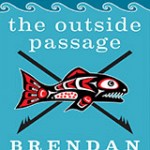
Podcast: Play in new window | Download
Publishing Talks: David Wilk interviews Charles Bernstein and Al Filreis of PennSound
December 4, 2013 by David
Filed under Publishing History, PublishingTalks, Technology
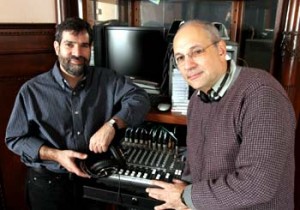 In this series of interviews, called Publishing Talks, I have been talking to book industry professionals and other smart people about the future of publishing, books, and culture. This is a period of disruption and change for all media businesses. We must wonder now, how will publishing evolve as our culture is affected by technology, climate change, population density, and the ebb and flow of civilization and economics?
In this series of interviews, called Publishing Talks, I have been talking to book industry professionals and other smart people about the future of publishing, books, and culture. This is a period of disruption and change for all media businesses. We must wonder now, how will publishing evolve as our culture is affected by technology, climate change, population density, and the ebb and flow of civilization and economics?
It’s my hope that these conversations can help us understand the outlines of what is happening in publishing and writing, and how we might ourselves interact with and influence the future of publishing as it unfolds.
PennSound is a very special online resource that was instigated by founders Al Filreis and Charles Bernstein with the incredible support of the University of Pennsylvania in Philadelphia. There is really nothing like it in the world, and for anyone interested in poetry, poetics, or the literary world of the past 100 years, it is an incredibly important resource. The energy and dedication that has gone into this unmatched collection of recordings of poets reading, lecturing and talking about poetry is a gift whose impact will be felt for many years to come.
Filreis wears many hats – he is Kelly Professor at UPenn, Director, Center for Programs in Contemporary Writing, Co-Director, PennSound, Publisher of the literary magazine Jacket2 as well as Faculty Director, Kelly Writers House. In addition, he is the author of a number of books of criticism. Charles Bernstein, an old friend of mine, is one of the most important poets and critical thinkers of his generation of writers. He was the David Gray Professor of Poetry and Letters at the SUNY Buffalo and Director of the Poetics Program, which he co-founded with poet Robert Creeley. At SUNY, he co-founded the Electronic Poetry Center with Loss Glazier. Charles is currently the Donald T. Regan Professor of English and Comparative Literature at the University Pennsylvania. He was a co-founder also of the important literary magazine L-A-N-G-U-A-G-E and is the author of many books of poetry and theoretical writings about poetry, language and thinking. Also in this discussion is Michael Hennessey, the editor of PennSound, and author of the “PennSound Daily” column. Michael holds an MFA in Creative Writing from Emerson College and has published critical work in magazines and anthologies.
I wanted to talk to Filreis, Bernstein and Hennessey about how PennSound came into being, to learn more about its scope and breadth, and to hear first hand their plans for the future. My hope is that our discussion will draw as much attention and support to PennSound as possible. And I can’t help enjoying the appropriateness of presenting an audio experience of this essential audio resource. There is something new and compelling posted at PennSound almost every day. Please visit, spend some time, and enjoy the rich trove of poetry as spoken and discussed by the poets themselves.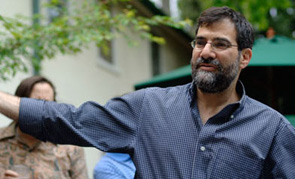 Even those who don’t read or even like poetry have their minds changed by the experience of hearing the words out loud.
Even those who don’t read or even like poetry have their minds changed by the experience of hearing the words out loud.
Podcast: Play in new window | Download
Douglas Trevor: Girls I Know (A Novel)
October 2, 2013 by David
Filed under Fiction, WritersCast
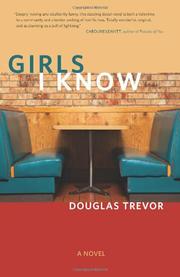 978-0983150534 – Sixoneseven Books – paperback – May 1, 2013 – $15.95 (ebook versions available at lower prices)
978-0983150534 – Sixoneseven Books – paperback – May 1, 2013 – $15.95 (ebook versions available at lower prices)
A debut novel set in Boston, Girls I Know has an unusual narrative structure that sometimes feels like a love song to the city of Boston as much as a novel about the protagonist, tortured failed graduate student, Walt Steadman. Walt is a classic nebbish – dropped out of graduate school writing a thesis on an obscure poetic subject, making his living now as a sperm donor and doing odd jobs.
Walt is painfully obsessive – as a way to channel his feelings of failure and indirection. He goes to the same small coffee shop for breakfast almost every day, where he befriends the owners and their daughter, Mercedes. He loves Boston in an obsessive way too. The real story of the novel begins when Walt is survives a terrible shooting at his favorite restaurant which leaves four people dead, including his friends.
Now he is forced to confront himself and in his recovery, try to find the self he has buried in his self indulgent lifestyle. The girls he knows are both complicated – the effervescent Ginger Newton, Harvard undergraduate – another obsessive, but a much more active one, she is writing a book called Girls I Know about women and their jobs and the heartbroken and speechless Mercedes, whose parents are now dead. How he interacts with these two “girls” on his path to self discovery and redemption are what this book is really about.
I liked this book much more than I initially thought I would (coming of age stories are not usually my forte as a reader). Trevor is a very good storyteller, and his characters are all interesting and well drawn. And his Boston comes to life throughout the book. Trevor knows his way around characters and places and his writing is strong. His collection of short fiction, The Thin Tear In The Fabric Of Space, won the Iowa Short Fiction award in 2005. Author website here. Kudos to this independent publisher, Sixoneseven, for doing an excellent production job and a serious effort to market and promote a very good book.
Kudos to this independent publisher, Sixoneseven, for doing an excellent production job and a serious effort to market and promote a very good book.
Podcast: Play in new window | Download
Sites We Like: PennSound
PennSound is an incredible project established by Al Filreis and Charles Bernstein with tremendous support from the University of Pennsylvania, collecting poetry in audio form from an incredible array of sources. There really isn’t anything like it anywhere. There are historical recordings, so many of which are fantastic and powerful, that it is almost impossible to know where to start. All the poets whose work matters to me are here. And there are many voices from the recent past and the present as well. You can spend hours on this site and of course you will never be able to experience the full range of what they have, there is just too much. And there is new work added or highlighted every day! Amazing. For anyone interested in the sound of writing, this is a site you must visit.
Al Filreis and Charles Bernstein at PennSound (photo by Mark Stehle)
PennSound Daily is written by Michael S. Hennessey.
Want to read more?
- Control the number of PennSound Daily entries you’re viewing with the drop-down box at the top of the page, or
- visit the PennSound Daily archive.
You can subscribe to ![]() PennSound Daily with your favorite RSS feed reader. Or, use this link
PennSound Daily with your favorite RSS feed reader. Or, use this link ![]() to add PennSound Daily to your Google Reader or iGoogle homepage.
to add PennSound Daily to your Google Reader or iGoogle homepage.
Luis J. Rodriguez: It Calls You Back: An Odyssey through Love, Addiction, Revolutions, and Healing
December 13, 2012 by David
Filed under Non-Fiction, WritersCast
 978-1-416584162 – Touchstone – Hardcover – $24.99 (978-1-416584179, paperback $15.99; ebook editions available at lower prices)
978-1-416584162 – Touchstone – Hardcover – $24.99 (978-1-416584179, paperback $15.99; ebook editions available at lower prices)
This is flat out a stunning book. Luis tells his life story pulling no punches, avoiding no pain, either that he has given to others or that others gave to him. Years ago, when I read his first memoir Always Running (some pieces of which are repeated or retold here), I knew that he was a great storyteller. His poetry is crystal-like, full of shards of emotion and insight.
Rodriguez is a powerful writer. His prose flows like a river and carries you along with Luis, as he makes terrible mistakes, strives to become better, to understand who he is in a terrible, painful and challenging world. He grew up in California, child of immigrants, always struggling, and early on in life, unlike anyone else in his family, was drawn into the gang life, engaged in all sorts of crime, did drugs, was violent, full of rage and sorrow. But he was always a reader, always smart enough, emotionally engaged enough, to want more, to be engaged, to struggle. In It Calls You Back, Rodriguez documents everything, how he became a writer, politically engaged, an activist working with gangs, a lover, husband and father, whose own son makes the dramatic and terrible mistake that changes his life forever, despite everything Luis thought he had done to help his son escape La Vida Loca (the crazy life) of the gangs.
It has taken years for Rodriguez to become who he is today, but his past life is always with him, always running inside his heart and soul. His life’s work is all about engagement, transformation, and social change. I admire what he has done to turn his experiences into such powerful action. Reading this book is as transformative for the reader as it was for the author. I hope my conversation with Luis will help illuminate and amplify the story he has to tell.
Visit the author’s website here and that of his independent Tia Chucha Press, learning and cultural center here.
Podcast: Play in new window | Download
Publishing Talks: David Wilk interviews Coffee House Press Founder Allan Kornblum
December 5, 2012 by David
Filed under Publishing History, PublishingTalks
 In this series of interviews, called Publishing Talks, I talk to book industry professionals and other smart people about the future of publishing, books, and culture. This is a period of disruption and change for all media businesses. How will publishing evolve as our culture is affected by technology, climate change, population density, and the ebb and flow of civilization and economics?
In this series of interviews, called Publishing Talks, I talk to book industry professionals and other smart people about the future of publishing, books, and culture. This is a period of disruption and change for all media businesses. How will publishing evolve as our culture is affected by technology, climate change, population density, and the ebb and flow of civilization and economics?
I hope these Publishing Talks conversations will help us better understand the outlines of what is happening in publishing, books and reading culture, and how we can ourselves both understand and influence the future of books and reading. Over the past couple of years, I’ve been talking to a wide variety of people in the book business, mostly about the future of writing, publishing, and reading. But the future is always built on what has gone before now. And there has been so much incredibly creative and wonderful publishing work done in recent years, I’ve wanted to share some of the experiences of people who have accomplished so much, with vision, talent and amazing effort.
I’ve known Allan Kornblum, founder of Coffee House Press (and its predecessor, Toothpaste Press), a long, long time. He and I started out in publishing in similar ways and around the same time, the early 1970s. Allan started out as many of us did in those days publishing a handmade mimeo magazine. But he discovered fine printing by taking classes at the University of Iowa with the renowned Harry Duncan (Cummington Press – there is a great interview with him in a wonderful book called Against the Grain, interviews with independent publishers, you can access this book online through Project Muse). Allan’s Toothpaste Press used letterpress printing to create beautiful poetry books and chapbooks for ten years beginning in 1973, when Allan and his wife Cinda lived in West Branch, Iowa (home of Herbert Hoover).
The Kornblums eventually faced an existential crisis with Toothpaste, to either become a letterpress “art press,” producing limited editions at high prices, with limited readership and distribution, or to aim for a broader audience, which for a low margin literary press, requires financial support. Kornblum elected to create a nonprofit publishing venture, renamed Coffee House Press, and moved to the Twin Cities in Minnesota, the literary mecca of the midwest (then as now), where the press has thrived along with several other excellent publishers, with a literary arts center, and an extremely supportive community of readers and writers. Now having published there for almost thirty years, Coffee House is an established an active organization, with a strong board and staff, and a tremendous list of books to its credit, many of which have won awards and have sold extremely well. Coffee House has maintained consistently high editorial and production standards, but it has also been a successful and innovative book marketer, embracing a wealth of tools and approaches to finding audiences for its books.
Interviewing Allan for Publishing Talks was a pleasure for me. I’d also like to recommend listeners to a written interview with Allan from 2006 that can be found at NewPages.com. And visit the Coffee House Press website to see their latest books as well as their exceptional and impressive backlist.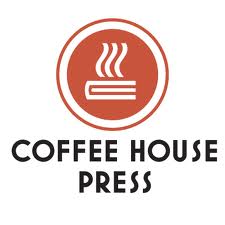 Listener alert! These interviews with independent publishers, documenting their history and experiences, are longer than usual. This one is 53 minutes long. Pull up a chair….
Listener alert! These interviews with independent publishers, documenting their history and experiences, are longer than usual. This one is 53 minutes long. Pull up a chair….
Podcast: Play in new window | Download
E. Ethelbert Miller: The Fifth Inning
June 21, 2012 by David
Filed under Non-Fiction, WritersCast
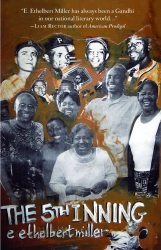 978-1604865219 – PM Press – Paperback – $15.95 (ebook versions available at lower prices)
978-1604865219 – PM Press – Paperback – $15.95 (ebook versions available at lower prices)
E. Ethelbert Miller is a writer and literary activist. He is currently the board chairperson of the Institute for Policy Studies (IPS). Since 1974, he has been the director of the African American Resource Center at Howard University. Ethelbert is also the former chair of the Humanities Council of Washington, D.C. and a former core faculty member of the Bennington Writing Seminars at Bennington College. He’s published more than ten books, in both poetry and prose, has edited a number of anthologies, and his writing is widely anthologized. He’s won all sorts of awards and recognition for his writing and for his longstanding work in support of writing as a community and cultural effort. In addition, for several years he hosted the popular weekly radio program Maiden Voyage on WDCU-FM, as well as Vertigo On The Air on WPFW.
Ethelbert has long been a favorite poet of mine, whom I got to know years ago when I lived in Washington, D.C., where Eth still resides. We’re of a similar age and share various passions, not the least of which is baseball.
So it is no wonder that I jumped at the chance to read his memoir, The Fifth Inning, and then to talk to him about it on Writerscast. This is a terrific book, unusual in its shape and structure, which is both poetically charged and carefully built. Ethelbert allows himself to write honestly and purely about his own life, his insecurities, pain and suffering, but without ever becoming self indulgent or overwrought. There is always hope, and the sense that something good, or even great, will come from all this “stuff” we go through in life.
Thinking of a baseball game, the fifth inning out of nine is, of course, the turning point. After the fifth inning, a game can end early but still be considered an official game – a life lived, though abbreviated. So here he is, in the fifth inning of his imagination, looking back at the beginning of the game, and at the present where it’s about to start the last stretch toward the end and the final score. It’s a good time to take stock and get ready to see what you can do to get past the hitters coming up to bat. When you’re pitching you need to pace yourself, remember what worked and didn’t work in the early innings, and use what you have learned to keep the hitters off stride and getting the outs you need to win the game.
Poets’ memoirs are sometimes brittle and too carefully built to sustain a personal story. Ethelbert is not that kind of poet. He’s active and alive in every moment, and brings his readers right into his head and heart. This is a beautifully constructed and written piece of personal writing that I hope will find a audience far beyond the literary community. What Ethelbert has to say about being human and growing older is important for all of us to hear.
Ethelbert’s website is here, well worth a visit. And I wanted to mention that this is a Busboys & Poets book published by PM Press, a publisher I hope readers will learn about and support. Buy the book direct from the publisher to support independent publishing and alternative culture.
Podcast: Play in new window | Download
Margot Peters: Lorine Niedecker, A Poet’s Life
February 22, 2012 by David
Filed under Non-Fiction, Poetry, WritersCast
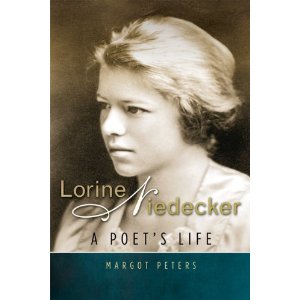 978-0299285005 – University of Wisconsin Press – Hardcover – $34.95
978-0299285005 – University of Wisconsin Press – Hardcover – $34.95
I have loved the poetry of Lorine Niedecker, and been deeply influenced by her work and life since being introduced to her writing by the great poet and independent literary publisher, Jonathan Williams, just a few years after her untimely death in 1970. His outstanding press, The Jargon Society, published one of the largest collections of her work during her all too brief lifetime (T & G: Collected Poems, 1970). In the years since her death, she has been discovered by many writers, scholars and general readers and her work is available now in several great collections, including Collected Works, edited by Jenny Penberthy, from the University of California Press.
For the many who still do not know of her, Lorine Niedecker (1903-1970) was born, raised, schooled and lived almost her entire life in Wisconsin. She was a poet her entire adult life, mostly self-educated, but always deeply involved in the milieu of modernist poetry and experimental writing. The most famous of her peers were William Carlos Williams (who knew and appreciated her writing), Louis Zukofsky (with whom she had a very deep and complicated relationship), and George Oppen and Carl Rakosi, among many others. But as a woman writer who worked hard for a living during a time when men ruled the literary roost, she wrote mostly in obscurity, known only to a small number of other writers who appreciated the brilliance of her imagination and craft.
My friend tree
I sawed you down
but I must attend
an older friend
the sun
Margot Peters’ new biography, Lorine Niedecker, A Poet’s Life, is a wonderful book, reflecting Peters’ own love and appreciation for her subject’s life and writing. Lorine’s life story is important to read about, whether you have read her poetry or not. It’s a powerful introduction to a complicated and unique American life. Lorine never had it easy. Her family life was difficult, her poor eyesight was a difficulty for her entire life, her relationships with men were complicated and often painful for her, and she never received the attention her writing deserved. Peters tells the story of her life in great detail, but is never boring. She interviewed people who knew Lorine where she lived in Wisconsin, and even those who, like me, think they know Lorine and her work will learn a great deal about her. Peters is perceptive and clear eyed about Lorine and aware of the difference between the life as lived and the poetry as written. For the poet, it is always the words that matter. Peters knows this too.
Reading about Lorine Niedecker continually reminded me of the power of her intellect and the depth of her brilliance as a poet. She honed and sharpened constantly, like a jeweler bringing a stone to life. Her reading was vast, her intelligence and clarity of vision virtually unmatched. I do not think it is an understatement to call Niedecker one of the greatest poets America has ever produced.
Poet’s work
Grandfather
advised me:
Learn a trade
I learned
to sit at desk
and condense
No layoff
from this
condensery
Every poet, every writer, should read and absorb these words.
If it’s not obvious, I have been smitten by this poet’s work for a really long time. This biography is a terrific addition to the Niedecker opus, and is highly recommended. I had a great time talking to Margot Peters, whose knowledge of Niedecker, Wisconsin and poetry is broad, deep and very well put together.
Please visit the Lorine Niedecker website to learn more about her, sample some poetry, and to get a feel for Fort Atkinson, where she lived most of her life. You can visit Margot Peters’ website for more about her book as well. There is now an annual Niedecker Poetry Festival in Fort Atkinson, Wisconsin every fall.
There is now an annual Niedecker Poetry Festival in Fort Atkinson, Wisconsin every fall.
Books by and about Niedecker:
New Goose. Prairie City, Ill.: Press of James A. Decker, 1946.
My Friend Tree. Edinburgh: Wild Hawthorne Press, 1961.
North Central. London: Fulcrum Press, 1968.
T & G: Collected Poems 1936-1966. Penland, N.C.: Jargon Society, 1969.
My Life By Water: Collected Poems 1936-1968. London: Fulcrum Press, 1970.
Blue Chicory. Edited by Cid Corman, New Rochelle, N.Y.: The Elizabeth Press, 1976.
From This Condensery: The Complete Writings of Lorine Niedecker. Edited by Robert J. Bertholf, Jargon Society/Inland Book Company, 1985.
The Granite Pail: Selected Poems of Lorine Niedecker. Edited by Cid Corman, North Point Press, 1985.
Collected Works. Edited by Jenny Penberthy, Berkely: University of California Press, 2002.
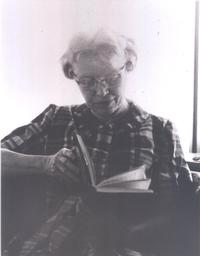 (note, I owe apologies to LN – in the poem Poet’s Work above, I could not get the spacing to work right here, please read it either on the Niedecker site or in the Collected Works to see it the way the poet meant it to look on the page)
(note, I owe apologies to LN – in the poem Poet’s Work above, I could not get the spacing to work right here, please read it either on the Niedecker site or in the Collected Works to see it the way the poet meant it to look on the page)
Podcast: Play in new window | Download
Publishing Talks: David Wilk interviews Charles Alexander
March 28, 2011 by David
Filed under Ebooks and Digital Publishing, Publishing History, PublishingTalks, Technology, The Future
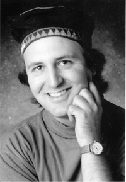 In this series of interviews, called Publishing Talks, I have been talking to book industry professionals and other smart people about the future of publishing, books, and culture. This is a period of disruption and change for all media businesses. We must wonder now, how will publishing evolve as our culture is affected by technology, climate change, population density, and the ebb and flow of civilization and economics?
In this series of interviews, called Publishing Talks, I have been talking to book industry professionals and other smart people about the future of publishing, books, and culture. This is a period of disruption and change for all media businesses. We must wonder now, how will publishing evolve as our culture is affected by technology, climate change, population density, and the ebb and flow of civilization and economics?
I hope these Publishing Talks conversations can help us understand the outlines of what is happening in the publishing industry, and how we might ourselves interact with and influence the future of publishing as it unfolds.
These interviews give people in and around the book business a chance to talk openly about ideas and concerns that are often only talked about “around the water cooler,” at industry conventions and events, and in emails between friends and they give people inside and outside the book industry a chance to hear first hand some of the most interesting and challenging thoughts, ideas and concepts being discussed by people in the book business.
Charles Alexander is the founder and prime mover behind Chax Press, a nonprofit publisher and studio. As he describes it on the website Chax “publishes writing that does not take things for granted — things like “what is a poem,””what is an author,” or “what does it mean to read?” Walt Whitman said, “Reading is a gymnast’s act.” We strive to make books that reward such exercise in stunning ways.”
Whether working with handset type, Vandercook proof press, carved wood blocks, linen threads and fine papers, or with computers, Chax Press books celebrate the changing shape of American poetry by presenting experimental works with humanist commitment. Chax also brings its work to the public in ways other than in books, sponsoring poetry readings, writers- and artists-in-residence, exhibitions, and more events that encourage a public investigation as to the nature and importance of contemporary poetry and book arts.
Chax Press was founded in 1984 in Tucson. More than 50 books have followed between then and the present, including several published during Chax’s three years (1993-96) in Minneapolis, where Alexander served as Executive Director of Minnesota Center for Book Arts.
In general, Chax Press publishes experimentalist works that share a strong humanist commitment. Chax Press chapbooks are published in small editions and mix desktop publishing technologies with hand bookbinding practices and, at times, fine art papers.
I’ve known Charles Alexander for many years and love the work he has done with Chax. I thought it would be extremely rewarding to talk to him about modern publishing and his vision of books and readers, especially now, when the current talk about digital publishing dominates our environment. Anyone who has set type, printed pages and made paper by hand for a living is certain to possess a valuable perspective on the literal relationship between word and eye that still is so important to the work of publishers in any environment. Charles and I had a great time talking about Chax and its wonderful work.
The Chax website is well worth a visit, as is Charles’ blog, and if you find yourself in Tucson, go see the Chax Press facility, which is a wonderful and central hub of the Tucson poetry and arts community.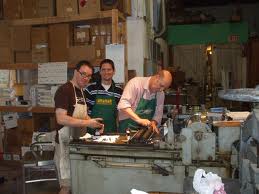

Podcast: Play in new window | Download
Publishing Talks: David Wilk interviews Don Leeper
February 14, 2011 by David
Filed under Ebooks and Digital Publishing, PublishingTalks, Technology, The Future
 In this series of interviews, called Publishing Talks, I have been talking to book industry professionals and other smart people about the future of publishing, books, and culture. This is a period of disruption and change for all media businesses. We must wonder now, how will publishing evolve as our culture is affected by technology, climate change, population density, and the ebb and flow of civilization and economics?
In this series of interviews, called Publishing Talks, I have been talking to book industry professionals and other smart people about the future of publishing, books, and culture. This is a period of disruption and change for all media businesses. We must wonder now, how will publishing evolve as our culture is affected by technology, climate change, population density, and the ebb and flow of civilization and economics?
I believe these Publishing Talks conversations can help us understand the outlines of what is happening in the publishing industry, and how we might ourselves interact with and influence the future of publishing as it unfolds.
These interviews give people in and around the book business a chance to talk openly about ideas and concerns that are often only talked about “around the water cooler,” at industry conventions and events, and in emails between friends and they give people inside and outside the book industry a chance to hear first hand some of the most interesting and challenging thoughts, ideas and concepts being discussed by people in the book business.
Don Leeper is the founder of Bookmobile, based outside of Minneapolis, providing outsourced production services to independent and academic publishers all over the world. The company was founded as Stanton Publication Services in 1982, and has grown significantly over the years, now offering not only pre-press services for print books, as well as growing digital printing business, an expanding range of digital book production services, including ebooks and apps, and even an off-shoot business for book distribution. OR Books has hired Bookmobile to provide all of its production services, as some other publishers have also done.
What attracted my attention most recently to this company is their announcement of Ampersand, an iPad app created to preserve the layout and pagination of poetry (and of course any other book for which specific line and page layouts are critical). It’s been one of the raps on ebooks that poetry essentially does not work in the Kindle (mobi) and other popular reading devices or platforms that use ePub as the format for their content. Ampersand enables publishers (and poets who want to publish their own work) to preserve complex page compositions easily and as an app provides both a reading environment and a sales structure on the iPad (and presumably the iPhone and iPod as well).
Clearly Leeper and his crew are creative and working hard to provide a wide range of needed services for independent and academic publishers, for whom the fast changing digital environment presents significant challenges. He’s also a great example of someone who has been agile in moving from traditional publishing workflows into new digital realms while retaining a strong commitment to the important values of design and interface that will always be necessary for writers, publishers and readers, whatever the devices or delivery systems they use for reading.
Ampersand shows alot of promise for many independent publishers of poetry and other types of work where the actual page concept still matters, especially because cost of production matters most for small circulation content (there are certainly other PDF based e-book publishing methods available, but most are more costly and not highly automated). A few poetry publishers are on board with Bookmobile to pilot the Ampersand project, and we’ll be interested to see some finished work in coming months.
In this interview, Don and I had a wide ranging and lively conversation about digital publishing, poetry, and the future of print and ebooks.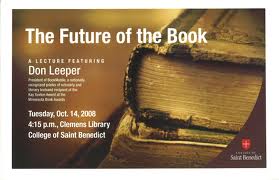
![]()
Podcast: Play in new window | Download


